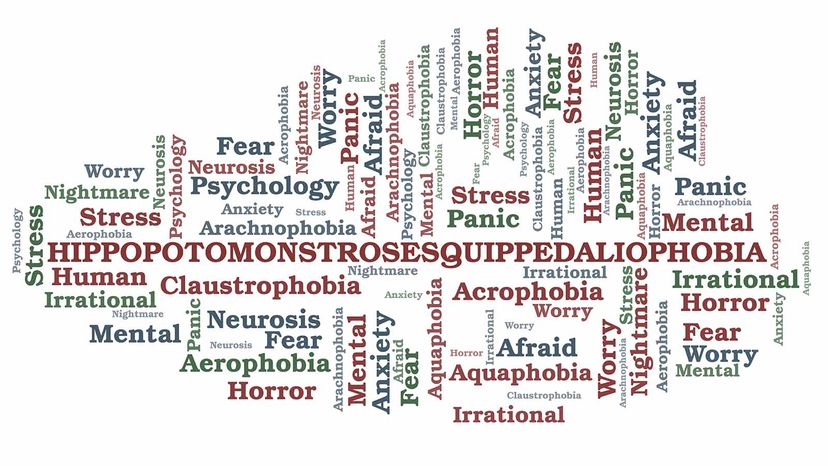 “Hippopotomonstrosesquippedaliophobia is the fear of long words, and also is one of the longest words in the English language. Ironic, right? Sharaf Maksumov/Shutterstock
“Hippopotomonstrosesquippedaliophobia is the fear of long words, and also is one of the longest words in the English language. Ironic, right? Sharaf Maksumov/Shutterstock
What’s your greatest fear? Snakes, spiders, flying, public speaking? You might just be afraid of these, but what if that fear became unrealistic and triggered serious anxiety and depression? That’s when it becomes a phobia.
There are three types of phobias, according to Harvard Health:
- Specific phobia (simple phobia): This is the most common type, like when someone has a specific fear of animals (arachnophobia, i.e., fear of spiders) or people, (coulrophobia, i.e., clowns).
- Social anxiety disorder (formerly called "social phobia"): People with social anxiety disorder fear social situations (public speaking, for instance, or using a public restroom).
- Agoraphobia: This is the fear of crowds and open spaces, like concerts and large events.
We can determine many phobias without much trouble based on their terminology. Hydrophobia is the fear of water; hemophobia is the fear of blood. But others aren’t so easy.
Fear of Long Words
If spiders and blood don’t make your palms sweat, what about words like pneumonoultramicroscopicsilicovolcanoconiosis or supercalifragilisticexpialidocious? If those twist more than your tongue in knots, then it could be because of hippopotomonstrosesquippedaliophobia. And even Mary Poppins can’t make that go down with a spoonful of sugar.
So, is hippopotomonstrosesquippedaliophobia the fear of hippos? Hip-hop music? No, it’s actually the fear of long words, ironic because it’s also one of the longest words in the English language. It’s also called sesquipedalophobia, which is from the Latin root sesquipedalian, meaning "long word," though why it’s not just called that is beyond me. It seems over generations some linguists with a streak of sarcasm (or meanness) decided to make it even longer for those who are already fearful of long words.
As rare as it is, fear of long words is very real for some people. Someone whose job relies on language, such as an English teacher or, say, a freelance writer, might have serious difficulties making it through a writ with such words embedded in it.
While many phobias manifest in external symptoms like shaking, freezing in place or sweating, the symptoms of the fear of long words may be more subtle. They’re likely similar to glossophobia, or a fear of public speaking, which are thinking unclearly, nervousness or not being able to speak.
Like any fear, though, those who have it can experience anxiety, which could lead to social phobias, isolation and depression, especially if they’re faced with dealing with long words in public situations like a classroom or speaking engagement.
Most likely, someone with fear of long words would need to avoid careers or activities where they’re most likely to appear (medical, science, writing), and therefore limit career opportunities or related social situations.
Managing the Fear of Long Words
You can try to mitigate your fear by intentionally reading new materials, thumbing through a dictionary to learn new words, and playing word games or puzzles. In many cases, familiarity can ease the symptoms of anxiety.
Most importantly, because this fear can mimic or be confused with other conditions, don’t hesitate to seek the help of a trained mental health professional and be honest and open about your feelings and how they’re impacting your life.
Now That’s a Mouthful
The longest English word is the chemical name for a giant protein otherwise known as Titin, and is 189,819 letters long and takes more than three hours to say!














































